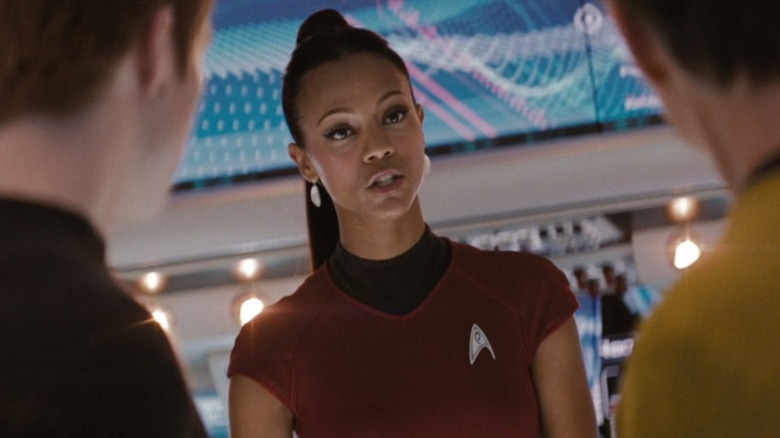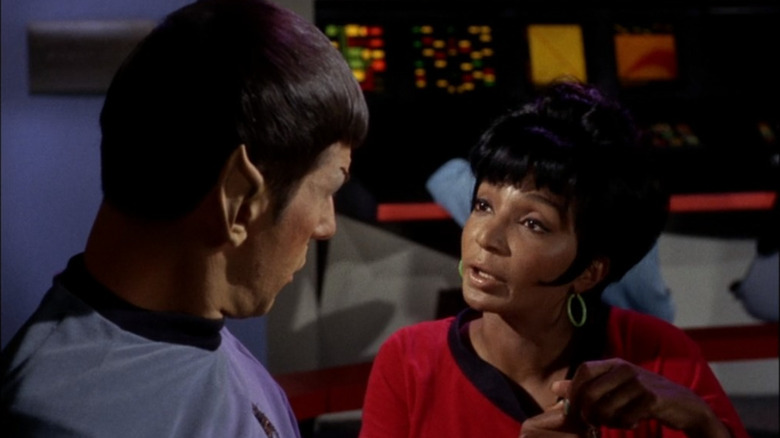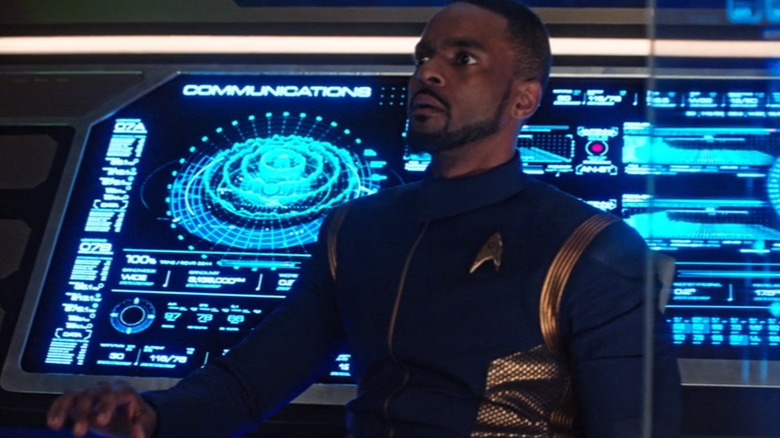Star Trek: What Does A Communications Officer Actually Do?
A starship is a complex beacon of exploration — a tool used to send members of Starfleet to the farthest reaches of space. It is meant to take us to where no man has ever gone before. With such an ambitious undertaking, a very long list of specialized crew members must be needed. The communications officer is one of the most important and maybe most often overlooked. As hinted by the title, this person is primarily tasked with handling all communications to and from the ship, making them one of the most vital crew members aboard.
Everything from visual communications to the bridge and the captain to distress calls, hails, text, and other forms of contact are filtered through this single point on the ship. Not only does the communications officer need to be adept at operating a long list of exceedingly complicated communications equipment, but they also need to be fluent, or at least passable, in as many languages as possible. Of course, speaking the language isn't enough if they have to deal with text communications, as well as audio and visual. They would theoretically need to be able to speak it as well.
Sure, the ship's captain has to make all the most challenging decisions that can be the difference between life and death. Engineering is responsible for keeping the ship in the air. Security's job is to keep everyone safe and sound and deal with any intruders on the ship. And medical is there to ensure that if anyone is not safe and sound, they get that way soon. All are essential jobs, but if the ship can't communicate with Mission Control, the crew is lost in the vastness of space.
Famous communications officers
Perhaps the most famous and well-known of the many communications officers we have seen over the breadth of the "Star Trek" franchise is Lieutenant Nyota Uhura. Played by the late Nichelle Nichols in the original series, Uhura was one of the core members of the crew that introduced fans to the Starship Enterprise and the likes of Captain James T. Kirk (William Shatner), Spock (Leonard Nimoy), Leonard McCoy (DeForest Kelly), Hikaru Sulu (George Takei), Scotty (James Doohan), and Pavel Chekov (Walter Koenig). Uhura, along with the rest, were reintroduced in the 2009 reboot, "Star Trek," which reimagined their destinies. This time, Uhura was played by Zoe Saldana ("Avatar," "Guardians of the Galaxy").
Another big name that has sat in the communications officer chair is Ensign Hoshi Sato. What makes her vitally crucial to the history of the position and Starfleet, in general, is that she was one of the first. She served aboard the Enterprise NX-01 under Captain Jonathan Archer (Scott Bakula). The ship greatly expanded Starfleet's presence in the Alpha and Beta Quadrants and made first contact with many species. The ship and its crew, along with Sato, are also credited with saving Earth from the Xindi and setting the stage for the United Federation of Planets. Sato was instrumental enough that Uhura wrote papers about her work and her exploits while a cadet in the Starfleet Academy.
The evolution of the position
Like all industries, technology threatened to hamper the number of jobs available for communications officers. The universal translator was present all the way back when Ensign Hoshi Sato was working the chair, but it was in its infancy, and she was still needed to translate most communications. However, by the time Ronald A. Bryce (Ronnie Rowe Jr.) was sitting in the chair in "Star Trek: Discovery," the universal translator had been built into most ships and translated thousands of languages. Of course, there is always a chance that they malfunction, ensuring that people like Bryce are always needed.
Communications officers like Uhura, Soto, and Bryce are some of the most integral crewmembers of the ships, serving as a bridge to the outside world. The United States Navy has a similar position known as the radioman. In the days of World War II, these talented soldiers were responsible for filtering communications ashore, on ships, and on submarines. They needed to be proficient in all radio frequencies, the gear to monitor them, and the languages being transmitted, like English, Russian, German, Japanese, and even Morse Code. The communications officers in Starfleet seem to be callbacks to these brave and brilliant soldiers as they take the same job into the great unknown, navigating languages across the galaxy, both known and unknown.


